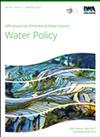Planning methodology for effective implementation of the rehabilitation policy for drinking water networks
IF 1.8
4区 环境科学与生态学
Q4 WATER RESOURCES
引用次数: 0
Abstract
Algeria is currently experiencing a real water shortage and leaks in the distribution networks, which affect the water supply. To reduce losses, the authorities have adopted a rehabilitation policy that requires resources that are not necessarily available. In this context, the aim of this study is to develop a decision support methodology for managers to enable them to plan urgent rehabilitation and to evaluate the benefits generated. The methodology consists of two phases: the diagnostic phase to identify a set of criteria, taking into account national specificities, and the planning phase, including the choice of Fuzzy-AHP for weighting and PROMETHEE II for ranking. An application is carried out on the Fouka network in Bejaia city (Algeria), consisting of 204 pipes. The application enabled the 204 pipes to be ranked in order of urgency and the benefits generated to be assessed in terms of environmental, economic, social, and technical parameters. The recovered water is significant in the first 60% of rehabilitated pipes. Investment costs are recovered within 3 years of the network being fully rehabilitated. The average reduction in network age is 5 years for every 10% of pipes rehabilitated. Complaints will be 0 after 70% of the pipes are rehabilitated.有效执行饮水管网修复政策的规划方法
阿尔及利亚目前正在经历真正的缺水和分配网络的泄漏,这影响了供水。为了减少损失,当局采取了一项需要资源的恢复政策,而这些资源不一定可用。在这方面,本研究的目的是为管理人员制订一种决策支助方法,使他们能够规划紧急的重建工作并评价所产生的效益。该方法包括两个阶段:诊断阶段,确定一套标准,考虑到各国的具体情况;规划阶段,包括选择模糊层次分析法进行加权和PROMETHEE II进行排序。在贝贾亚市(阿尔及利亚)的Fouka网络上进行了应用,该网络由204根管道组成。该应用程序可以根据紧急程度对204根管道进行排序,并根据环境、经济、社会和技术参数对产生的效益进行评估。在修复后的前60%的管道中,回收水非常重要。投资成本在网络完全修复后的3年内收回。每修复10%的管道,管网寿命平均缩短5年。70%的管道修复后,投诉将为零。
本文章由计算机程序翻译,如有差异,请以英文原文为准。
求助全文
约1分钟内获得全文
求助全文
来源期刊

Water Policy
环境科学-水资源
CiteScore
3.10
自引率
12.50%
发文量
81
审稿时长
6-12 weeks
期刊介绍:
Water Policy will publish reviews, research papers and progress reports in, among others, the following areas: financial, diplomatic, organizational, legal, administrative and research; organized by country, region or river basin. Water Policy also publishes reviews of books and grey literature.
 求助内容:
求助内容: 应助结果提醒方式:
应助结果提醒方式:


